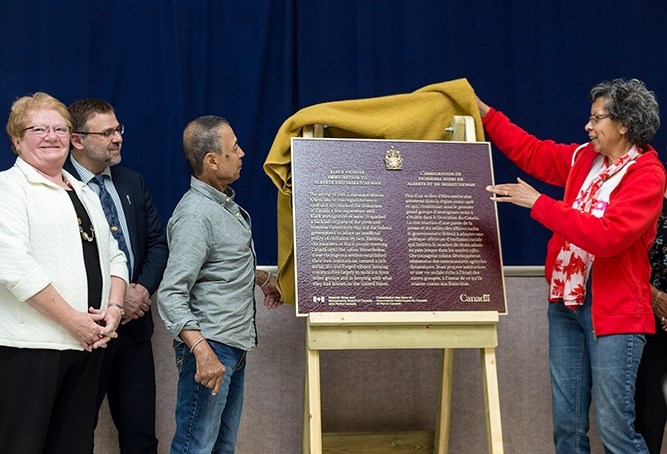Descendants of black pioneers fleeing racist policies in the United States at the turn of the 20th century have officially been recognized for their historical significance to Canada.
In a plaque unveiling ceremony May 13 at the Amber Valley Cultural Centre, federal, provincial and municipal officials alongside the Historic Sites and Monuments Board of Canada (HSMBC) and Parks Canada paid homage to the brave journey and settlement of the black pioneers over a hundred years ago.
Athabasca-Sturgeon-Redwater MLA Colin Piquette spoke about how black communities have helped shape local communities, and also spoke about their role in shaping Alberta as well as Canada’s development.
“Monuments such as this one help to create a greater level of awareness and understanding of the significant events that contributed to our rich history,” he said.
The plaque that was unveiled following dignitary speeches recognizes the thousands of black settlers who immigrated en masse to Canada in the early 1900s and were largely rejected by society at the time. It can be seen on the north side of Highway 55 next to a historical provincial sign about Amber Valley.
Between 1908 and 1911 black Americans made the trek north in response to the Canadian government’s call for settlers, leaving behind an escalating racist environment imposed by white settlement and Jim Crow laws imposed in 1908.
Amber Valley, previously known as Pine Creek, became one of their largest settlements.
Black immigration dramatically decreased well into the 1960s after the Canadian government imposed harsh entry regulations in attempt to discourage black settlement in response to backlash by influential Canadian groups and media.
Athabasca County Reeve Doris Splane said when preparing for the plaque unveiling ceremony, she tried to envision what the journey from the United States to Canada must have been like for the black settlers.
“They were running from turbulent oppression and violence, desperate … They left all that was familiar and located here, with many other immigrants,” she said. “They became an integral part of what is now Athabasca County. Their history is a major part of our history, and today I am so happy to celebrate their fortitude and their resilience.”
Myrna Wisdom is a descendent of black settlers who immigrated from the United States to the Amber Valley area. Rather than repeating the reasons for recognizing the settlers, or what caused them to flee their home, Wisdom said she would like to focus on a group of people whose role is often not recognized.
“Instead I’m going to focus on the role women played in shaping these settlements, because all too often their role is not recognized, and after all tomorrow is mom’s day,” she said.
From the midwife who travelled beaten paths by horseback to deliver babies for $25, or the woman who ran a grocery store and gas station and was also the community 4-H leader, to the women who made the first uniforms for the Amber Valley baseball team bleached from 100-pound flour sacks, Wisdom said the women played a vital role in the black settlement of the area.
Wisdom said the recognition of Amber Valley and black settlement is “long overdue,” and she has been persisting for years in achieving it.
“I appreciate this recognition from the federal government, because I always felt that our grandparents and parents deserve this long overdue recognition,” she said. “Our people had hopes and dreams, and they shared in all of the experiences which were unfortunately tainted by racism. For us to simply forget about them would be the ultimate indignity.”



